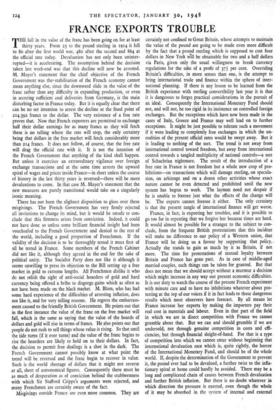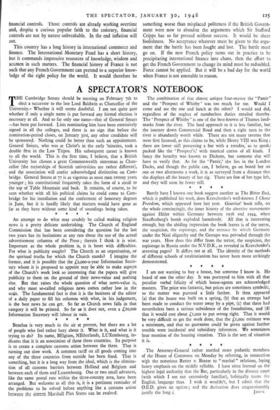FRANCE EXPORTS TROUBLE
THE fall in the value of the franc has been going on for at least thirty years. From 25 to the pound sterling in 1914 it fell to 8o after the first world war, 48o after the second and 864 at the official rate today. Devaluation has not only been uninter- rupted—it is accelerating. The assumption behind the decision taken last week-end was that this decline will now be arrested. M. Mayer's statement that the chief objective of the French Government was the" stabilisation of the French economy cannot mean anything else, since the downward slide in the value of the franc rather than any difficulty in expanding production, or even in securing sufficient coal deliveries from Germany, is the main disturbing factor in France today. But it is equally clear that there can be no set intention to arrest the decline at the fixed point of 214.392 francs to the dollar. The very existence of a free rate proves that. Now that French exporters are permitted to exchange half their dollar earnings for as many francs as they will fetch there is no telling where the rate will stop, the only certainty being that dollars in the free market will fetch considerably more than 214 francs. It does not follow, of course, that the free rate will drag the official rate with it. It is not the intention of the French Government that anything of the kind shall happen. But unless it exercises an extraordinary vigilance over foreign exchange transactions and at the same time arrests the upward spiral of wages and prices inside France—in short unless the course of history in the last thirty years is reversed—there will be more devaluations to come. In that case M. Mayer's statement that the new measures are purely transitional would take on a singularly ironic meaning.
There has not been the slightest disposition to gloss over these misgivings. The French Government has very firmly rejected all invitations to change its mind, but it would be unsafe to con- clude that this firmness arises from conviction. Indeed, it could not have done so unless some brilliant financial insight had been vouchsafed to the French Government and denied to the rest of the world, including a good proportion of Frenchmen. If the validity of the decision is to be thoroughly tested it must first of all be tested in France. Some members of the French Cabinet did not like it, although they agreed in the end for the sake of political unity. The Socialist Party does not like it although it seems unwilling to press its objection to the Bill setting up a free market in gold to extreme lengths. All Frenchmen dislike it who do not relish the sight of anti-social hoarders of gold and hard currency being offered a bribe to disgorge gains which as often as not have been made on the black market. M. Blum, who has had some hard experience of the difficulties of arresting inflation, does not like it, and for very telling reasons. He regrets the embarrass- ment caused to the friendly British Government. He points out that in the first instance the value of will .the franc on the free market wi fall, which is the same as saying that the value of the hoards of dollars and gold will rise in terms of francs. He also points out that people do not rush to sell things whose value is rising. So that until the tide turns (if it ever turns) and the value of the franc begins to rise the hoarders are likely to hold on to their dollars. In fact, the decision to permit free dealings is a shot in the dark. The French Government cannot possibly know at what point the trend will be reversed and the franc begin to recover in value. Such is the world shortage of dollars that it might not reverse at all, short of astronomical figures. Consequently there must be as much of desperation as of conviction behind the stubbornness with which Sir Stafford Cripps's arguments were rejected, and many Frenchmen are certainly aware of the fact.
Misgivings outside France are even more common. They are certainly not confined to Great Britain, whose attempts to maintain the value of the pound are going to be made even more difficult by the fact that a pound sterling which is supposed to cost four dollars in New York will be obtainable for two and a half dollars via Paris, given only the usual willingness to break currency regulations for the sake of a profit of 371 per cent. Overriding Britain's difficulties, in more senses than one, is the attempt to bring international trade and finance within the sphere of inter- national planning. If there is any lesson to be learned from the British experience with sterling convertibility last year it is that it is dangerous to forget practical considerations in the pursuit of an ideal. Consequently the International Monetary Fund should not, and will not, be too rigid in its insistence on controlled foreign exchanges. But the exceptions which have now been made in the cases of Italy, Greece and France may well lead on to further exceptions. It might be just possible to tolerate such a movement if it were leading to completely free exchanges in which the un- realities of the present official rates would be swept away. But it is leading to nothing of the sort. The trend is not away from international control toward freedom, but away from international control towards a tangled multiplicity of national controls—a sort of Schachtian nightmare. The result of the introduction of a free rate in France is not freedom but a whole new crop of pro- hibitions—on transactions which will damage sterling, on specula- tion, on arbitrage and on a dozen other activities whose exact nature cannot be even detected and prohibited until the new system has begun to work. The layman need not despair if he is unable to foresee just what the effects of the change will be. The experts cannot foresee it either. The only certainty is that the present tangle of international finance will get worse.
France, in fact, is exporting her troubles, and it is possible to go too far in repeating that we forgive her because times are hard. It would almost be possible for a stranger to the subject to con- clude, from the frequent British protestations that this incident will make no difference to our policy of a Western union, that France will be doing us a favour by supporting that policy.. Actually she stands to gain as much by it as Britain, if not more. The time for protestations of mutual loyalty between Britain and France has gone past. As in case of middle-aged married couples, such things can be taken for granted. But that does not mean that we should accept without a murmur a decision which might increase in any way our present economic difficulties. It is our duty to watch the course of the present French experiment with minute care and to have no inhibitions whatever about pro- testing at the top of our voices if it in fact leads to those dangerous results which most observers have forecast. By all means let France increase her exports by making the importers pay their real cost in materials and labour. Even in that part of the field in which we are in direct competition with France we cannot grumble about that. But we can and should grumble if we are undersold, not through genuine competition in costs and effi- ciencies, but through financial sleight-of-hand. For that is a type of competition into which we cannot enter without beginning that international devaluation race which is, quite rightly, the horror of the International Monetary Fund, and should be of the whole world. If, despite the determination of the Government to prevent it, the pound ever had to be devalued, a further twist to the infla- tionary spiral at home could hardly be avoided. There may be a long and complicated chain of causes between French devaluation and further British inflation. But there is no doubt whatever in which direction the pressure is exerted, even though the whole of it may be absorbed in the system of internal and external financial controls. Those controls are already working overtime and, despite a curious popular faith to the contrary, financial controls are not by nature unbreakable. In the end inflation will out.
This country has a long history in international commerce and finance. The International Monetary Fund has a short history, but it commands impressive resources of knowledge, wisdom and acumen in such matters. • The financial history of France is not such that any French Government can pretend to a superior know- ledge of the right policy for the world. It would therefore be something worse than misplaced politeness if the British Govern- ment were now to abandon the arguments which Sir Stafford Cripps has so far pressed without success. It would be sheer foolishness. No acceptance whatever must be given to the argu- ment that the battle has been fought and lost. The battle must go on. If the new French policy turns out in practice to be precipitating international finance into chaos, then the effort to get the French Government to change its mind must be redoubled. Force cannot be applied. But it will be a bad day for the world when France is not amenable to reason.



































 Previous page
Previous page